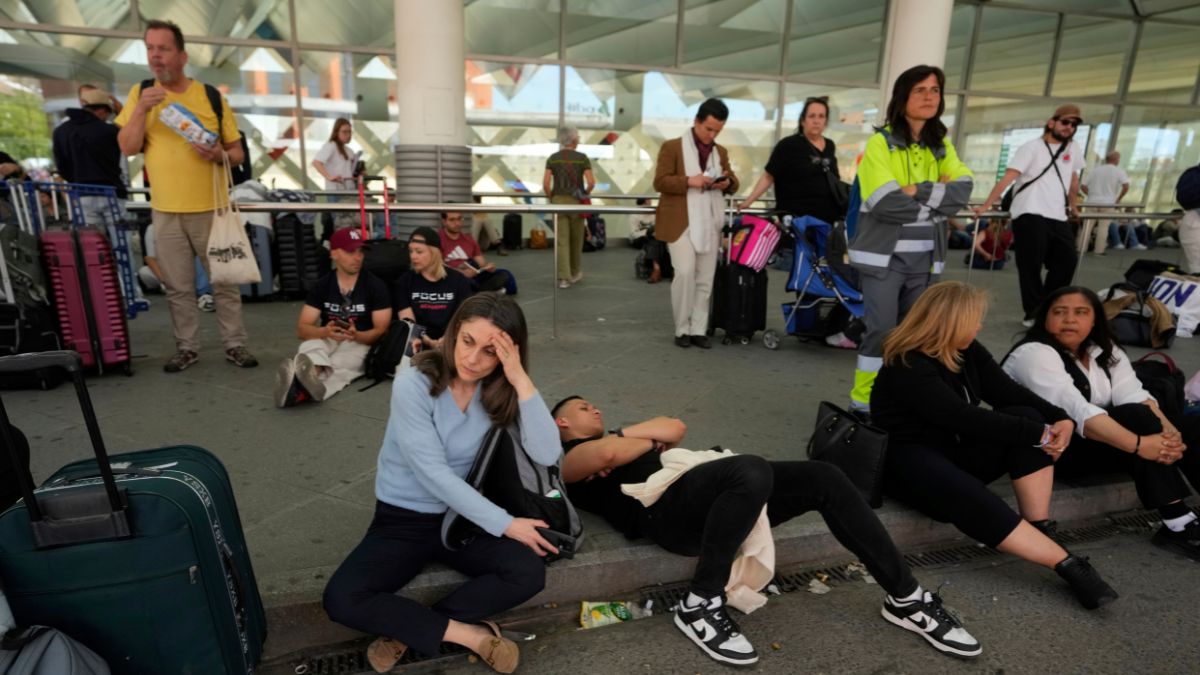Thousands of train passengers were stuck, flights were cancelled, and hospitals had to stop regular services after a major power cut hit most of Spain and Portugal on Monday.
Power is now slowly coming back. According to REE, Spain’s electricity operator, just over 82 per cent of power has returned. In Portugal, about 80 per cent of people are reported to have electricity again.
Spain has announced a state of emergency in what is said to be Europe’s biggest power failure.
ALSO READ | Why Spain has bid ‘adios’ to its popular golden visa programme
The outage knocked out lights and plug points, and led to sudden breakdowns in metro systems. In Madrid, traffic came to a halt after signals stopped working.
Officials are still trying to find out what caused the sudden collapse of the power grid.
In this explainer, we look at what led to the power cut in Spain and Portugal, what the authorities said, and how both countries were affected.
What caused the massive power outage in Spain and Portugal?
Portuguese Prime Minister Luis Montenegro said the problem began in Spain. Portugal’s grid operator REN explained that a “rare atmospheric phenomenon” had caused sharp temperature swings, which then led to widespread shutdowns.
REN said these extreme changes in temperature led to “anomalous oscillations” in very high-voltage lines in Spain. This is linked to what’s called “induced atmospheric variation”, which can create strong fluctuations in the grid.
These swings disrupted the synchronisation between power systems, leading to a series of failures across Europe’s connected network, it said.
Spain has not yet responded to these claims. REN also warned that it could take up to a week for the system to fully return to normal.
Montenegro said there was “no indication” that the blackout was the result of a cyberattack.
Antonio Costa, President of the European Council and Portugal’s former prime minister, also said there was “no evidence” pointing to a cyberattack, though he added that the exact cause is still not fully known.
Senior European Commission vice-president Teresa Ribera told Spain’s Radio 5 there was no sign of a deliberate act behind the outage. On Monday, Spain’s national security council met to review the situation.
Taco Engelaar, managing director at energy software firm Neara, told The Guardian that such a large-scale failure was “extremely unusual”.
“Interconnection between countries is vital for sharing clean energy, but it also creates new pathways for failure to spread quickly,” he said.
However, rumours of possible sabotage still circulated.
How the power outage impacted Spain and Portugal
By 11 pm local time, Spain had restored nearly 50 per cent of its power supply. Prime Minister Pedro Sanchez said the entire country of 48 million would have lights back on by the end of Tuesday.
The blackout was also reported to have affected residents in Andorra and parts of France near the Spanish border. Data showed that disruptions were recorded in Belgium as well.
This was the second major power outage in Europe in under six weeks, following a fire on March 20 that shut down Heathrow Airport in the UK.
In Madrid and Lisbon, offices were closed and traffic was affected. Some people in Barcelona even took it upon themselves to direct traffic. Train services in both Spain and Portugal came to a halt.
Emergency workers and railway staff in Spain helped evacuate around 35,000 people from more than 100 trains that were stuck when the power went out.
Hospitals and emergency services switched to backup generators, while petrol stations stopped operating. Mobile phone networks were largely down, although some messaging apps worked off and on. Many turned to battery-powered radios to get news.
Spain’s prime minister said the country was drawing electricity from Morocco and France to help restore supply to the south and north. Spain also ramped up production from hydroelectric and combined cycle thermal plants.
Airports in Spain were running on backup power, leading to some flight delays, according to Aena, which operates 56 airports across the country, including Madrid and Barcelona.
In Lisbon, airport terminals were closed, and tourists waited outside for updates on their flights.
Some people made the most of the blackout, gathering at restaurant terraces, parks and beaches to enjoy the sunshine. In Barcelona, crowds filled the streets in front of darkened shops, exchanging information.
“We are lucky. Some people got trapped in the metro. And there is a positive side: We are talking more with each other,” Monste Cortes told AP in Barcelona.
Portuguese police said traffic lights were out across the country, with metro services closed in both Lisbon and Porto.
“I just don’t know who to turn to. My daughter in Barcelona is giving birth. We’re going to miss the connection to get there,” Angeles Alvarez told Reuters while stranded outside Madrid’s Atocha railway station.
Internet traffic dropped sharply, falling by 90 per cent in Portugal and 80 per cent in Spain compared to the previous week, according to Cloudflare Radar, which tracks global internet traffic.
In Spain, about 43 per cent of energy comes from wind and solar power, 20 per cent from nuclear and 23 per cent from fossil fuels, according to the energy think tank Ember.
Authorities in Spain have asked people to avoid unnecessary travel and stay off the roads. In Portugal, police have also urged people to limit journeys because of the risks from failed traffic lights.
With inputs from agencies


)
)
)
)
)
)
)
)
)